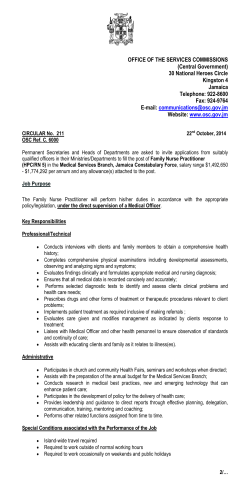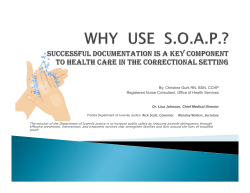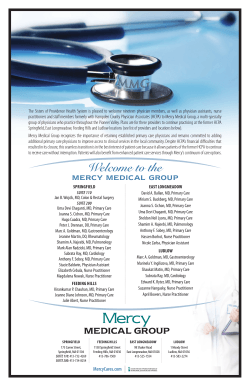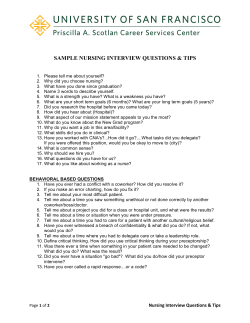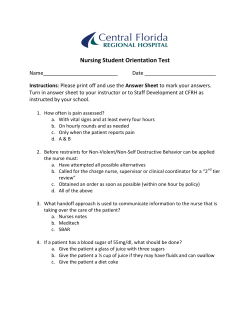
Senate Bill 323 as amended - California Association for Nurse
AMENDED IN SENATE MARCH 26, 2015 SENATE BILL No. 323 Introduced by Senator Hernandez (Principal coauthor: Assembly Member Eggman) February 23, 2015 An act to amend Section 2835.7 of the Business and Professions Code, relating to healing arts. legislative counsel’s digest SB 323, as amended, Hernandez. Nurse practitioners. The Nursing Practice Act provides for the licensure and regulation of nurse practitioners by the Board of Registered Nursing. The act authorizes the implementation of standardized procedures that authorize a nurse practitioner to perform certain acts, including ordering durable medical equipment in accordance with standardized procedures, certifying disability for purposes of unemployment insurance after physical examination and collaboration with a physician and surgeon, and, for an individual receiving home health services or personal care services, approving, signing, modifying, or adding to a plan of treatment or plan of care after consultation with a physician and surgeon. A violation of those provisions is a crime. This bill would make legislative findings and declarations with respect to the importance of care provided by nurse practitioners. This bill would authorize a nurse practitioner who holds a national certification from a national certifying body recognized by the board to practice without the supervision of a physician and surgeon, if the nurse practitioner meets existing requirements for nurse practitioners and practices in one of certain specified settings. The bill would authorize a nurse practitioner, in addition to any other practice 98 SB 323 —2— authorized in statute or regulation, to perform specified acts, including the acts described above, without reference to standardized procedures or the specific need for the supervision of a physician and surgeon. The bill, instead, would require a nurse practitioner to refer a patient to a physician and surgeon or other licensed health care provider if a situation or condition of the patient is beyond the scope of the nurse practitioner’s education and training. The bill would require a nurse practitioner practicing under these provisions to maintain professional liability insurance appropriate for the practice setting. By imposing new requirements on nurse practitioners, the violation of which would be a crime, this bill would impose a state-mandated local program. The California Constitution requires the state to reimburse local agencies and school districts for certain costs mandated by the state. Statutory provisions establish procedures for making that reimbursement. This bill would provide that no reimbursement is required by this act for a specified reason. Vote: majority. Appropriation: no. Fiscal committee: no yes. State-mandated local program: no yes. The people of the State of California do enact as follows: line 1 line 2 line 3 line 4 line 5 line 6 line 7 line 8 line 9 line 10 line 11 line 12 line 13 line 14 line 15 line 16 line 17 SECTION 1. The Legislature finds and declares all of the following: (a) Nurse practitioners are a longstanding, vital, safe, effective, and important part of the state’s health care delivery system. They are especially important given California’s shortage of physicians, with just 16 of 58 counties having the federally recommended ratio of physicians to residents. (b) Nurse practitioners will play an especially important part in the implementation of the federal Patient Protection and Affordable Care Act (Public Law 111-148), which will bring an estimated five million more Californians into the health care delivery system, because they will provide for greater access to primary care services in all areas of the state. This is particularly true for patients in medically underserved urban and rural communities. (c) Due to the excellent safety and efficacy record that nurse practitioners have earned, the Institute of Medicine of the National Academies has recommended full practice authority for nurse 98 —3— line 1 line 2 line 3 line 4 line 5 line 6 line 7 line 8 line 9 line 10 line 11 line 12 line 13 line 14 line 15 line 16 line 17 line 18 line 19 line 20 line 21 line 22 line 23 line 24 line 25 line 26 line 27 line 28 line 29 line 30 line 31 line 32 line 33 line 34 line 35 line 36 line 37 line 38 line 39 SB 323 practitioners. Currently, 20 states allow nurse practitioners to practice to the full extent of their training and education. (d) Furthermore, nurse practitioners will assist in addressing the primary care provider shortage by removing delays in the provision of care that are created when dated regulations require a physician’s signature or protocol before a patient can initiate treatment or obtain diagnostic tests that are ordered by a nurse practitioner. SEC. 2. Section 2835.7 of the Business and Professions Code is amended to read: 2835.7. (a) Notwithstanding any other provision of law, in addition to any other practices that meet the general criteria set forth in statute or regulation for inclusion in standardized procedures developed through collaboration among administrators and health professionals, including physicians and surgeons and nurses, pursuant to Section 2725, standardized procedures may be implemented that authorize a nurse practitioner to do any who holds a national certification from a national certifying body recognized by the board may practice under this section without supervision of a physician and surgeon, if the nurse practitioner meets all the requirements of this article and practices in one of the following: (1) A clinic as described in Chapter 1 (commencing with Section 1200) of Division 2 of the Health and Safety Code. (2) A facility as described in Chapter 2 (commencing with Section 1250) of Division 2 of the Health and Safety Code. (3) A facility as described in Chapter 2.5 (commencing with Section 1440) of Division 2 of the Health and Safety Code. (4) An accountable care organization, as defined in Section 3022 of the federal Patient Protection and Affordable Care Act (Public Law 111-148). (5) A group practice, including a professional medical corporation, another form of corporation controlled by physicians and surgeons, a medical partnership, a medical foundation exempt from licensure, or another lawfully organized group of physicians that delivers, furnishes, or otherwise arranges for or provides health care services. (6) A medical group, independent practice association, or any similar association. 98 SB 323 line 1 line 2 line 3 line 4 line5 line 6 line 7 line 8 line 9 line 10 line 11 line 12 line 13 line 14 line 15 line 16 line 17 line 18 line 19 line 20 line 21 line 22 line 23 line 24 line 25 line 26 line 27 line 28 line 29 line 30 line 31 line 32 line 33 line 34 line 35 line 36 line 37 line 38 line 39 line 40 —4— (b) Notwithstanding any other law, in addition to any other practice authorized in statute or regulation, a nurse practitioner may do any of the following: (1) Order durable medical equipment, subject to any limitations set forth in the standardized procedures. equipment. Notwithstanding that authority, nothing in this paragraph shall operate to limit the ability of a third-party payer to require prior approval. (2) After performance of a physical examination by the nurse practitioner and collaboration collaboration, if necessary, with a physician and surgeon, certify disability pursuant to Section 2708 of the Unemployment Insurance Code. (3) For individuals receiving home health services or personal care services, after consultation consultation, if necessary, with the treating physician and surgeon, approve, sign, modify, or add to a plan of treatment or plan of care. (b) Nothing in this section shall be construed to affect the validity of any standardized procedures in effect prior to the enactment of this section or those adopted subsequent to enactment. (4) Assess patients, synthesize and analyze data, and apply principles of health care. (5) Manage the physical and psychosocial health status of patients. (6) Analyze multiple sources of data, identify a differential diagnosis, and select, implement, and evaluate appropriate treatment. (7) Establish a diagnosis by client history, physical examination, and other criteria, consistent with this section, for a plan of care. (8) Order, furnish, prescribe, or procure drugs or devices. (9) Delegate tasks to a medical assistant pursuant to standardized procedures and protocols developed by the nurse practitioner and medical assistant, that are within the medical assistant’s scope of practice. (10) Order hospice care, as appropriate. (11) Order and interpret diagnostic procedures. (12) Perform additional acts that require education and training and that are recognized by the nursing profession as appropriate to be performed by a nurse practitioner. (c) A nurse practitioner shall refer a patient to a physician and surgeon or other licensed health care provider if a situation or 98 —5— line 1 line 2 line 3 line 4 line 5 line 6 line 7 line 8 line 9 line 10 line 11 line 12 line 13 line 14 SB 323 condition of the patient is beyond the scope of the education and training of the nurse practitioner. (d) A nurse practitioner practicing under this section shall maintain professional liability insurance appropriate for the practice setting. SEC. 3. No reimbursement is required by this act pursuant to Section 6 of Article XIII B of the California Constitution because the only costs that may be incurred by a local agency or school district will be incurred because this act creates a new crime or infraction, eliminates a crime or infraction, or changes the penalty for a crime or infraction, within the meaning of Section 17556 of the Government Code, or changes the definition of a crime within the meaning of Section 6 of Article XIII B of the California Constitution. O 98
© Copyright 2026
